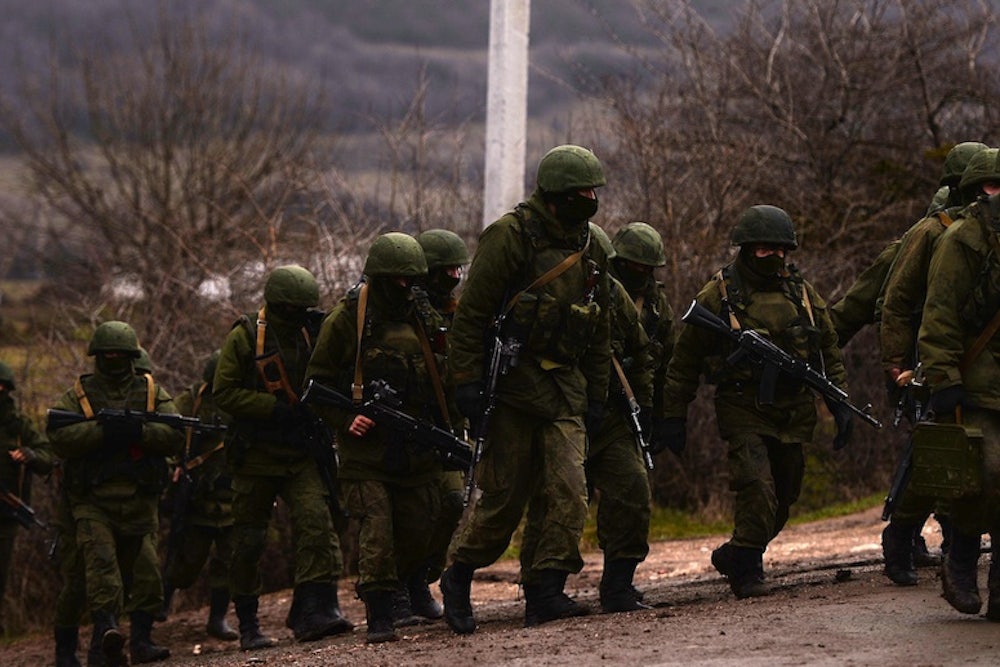Russia invaded Ukraine months ago, but President Vladimir Putin’s forces escalated the fighting this week. NATO announced that over 1,000 Russian soldiers are operating in the country’s Eastern region, while there are reports that regular Russian forces are barreling along the Sea of Azov toward the port city of Mariupol. Ongoing fighting between Russian and Ukrainian soldiers has left scores of Russians dead and wounded, with military hospitals near the border overflowing with injured troops and 100 Russian soldiers possibly killed in a single battle last week.
So, with dead and wounded Russian soldiers now being trucked back to the motherland, are they being recognized for their sacrifice? Is Putin honoring them, regardless of whether or not the cause for which they gave their lives was just?
Not at all.
The Russian government couldn’t care less about its dead soldiers. Paratroopers who have been killed in Ukraine are not receiving military funerals, nor are they being recognized for having died for their country. Rather, their graves have been kept unmarked.
One set of graves, near the Russian city of Pskov, initially had the names of the soldiers who were killed. Russian journalists reported that the names matched with the social media accounts of paratroopers from the same unit that occupied Crimea, the 76th Chernigovskaya division. Those accounts all went inactive around the time of the soldiers deaths, August 19-20. The names on the graves have since been removed, and journalists attempting to visit the site have received death threats from thugs at the cemetery.
This kind of behavior is nothing new for the Russian army.
Anna Politkovskaya, the Russian journalist whose 2006 murder sparked worldwide condemnation, reported that in 2002, more than 500 troops—a battalion’s worth—were killed from beatings connected with hazing in the Russian military. Even today, many soldiers commit suicide because the hazing rituals, known as dedovschina in Russian, become so torturous that the young men involved see no other way out.
But the Russian government’s disrespect for its own troops goes back much further. After World War II, Soviet POWs in German camps were marched straight to the Gulag prison camps as “spies and traitors,” where many perished. The mutiny of the battleship Potemkin, a 1905 revolt that later became famous in Soviet propaganda, begun after sailors on the ship were given rotten, maggot-infested meat as rations.
Today's oppressive political climate in Russia makes it difficult for anyone to speak out against the government’s military, but there have been rumblings of dissent. Dozhd, an independent TV channel based in Moscow, conducted an interview with Lev Schlosberg, a Pskov city official, who said that the lack of an official declaration of war “means that these people were sent, possibly, not knowing about the war, they were sent into confusion, to commit crimes, and did them as members of an illegal military formation. That’s where this wild secrecy and fear that someone will see the farewell comes from.”
What’s more, parents of soldiers across Russia have received letters over the past few days stating that their sons have been “sent to Lugansk.” That same report, from RBK, a popular news site, noted that Russian army conscripts have been forced to sign contracts readying them for service abroad. According to RAND corporation analyst Olga Oliker, “In principle, conscripts aren’t supposed to be sent into combat.”
The Committee of Soldier’s Mothers of the Russian Federation, an organization founded in 1989 with the liberalizing reforms of that period, has also refused to remain silent. (Anyone who’s been to Russia understands the bizarre power that old women wield there.) The committee released a list of 500 wounded and killed Russian soldiers, while the group’s secretary, Valentina Melnikova, wrote in an op-ed for Dozhd’s website that “no laws are being observed in relation to soldiers or in any case—none are being observed.”
The dissenters might even have public opinion on their side. Polls show that few Russians want military involvement in Ukraine. The Levada center, a Moscow-based polling organization, found at the end of July that only 10 percent of respondents would be in favor of sending in troops, while 47 percent supported “humanitarian aid.”
Not that the war in Ukraine is threatening to topple the Russian government. After all, most Russians don’t even know about much of the evidence I detailed above.
“If [Russian involvement] became more widespread, and especially if it somehow managed to spread despite the news censorship that’s commonplace in Russia now,” Dmitry Gorenburg, a Russian military analyst at the CNA corporation told me, “then we’d see a lot more opposition in the conflict than we’ve seen so far." But he added, “It could be a couple years before it’s something where the government begins to feel the pain in a way that affects them.”
